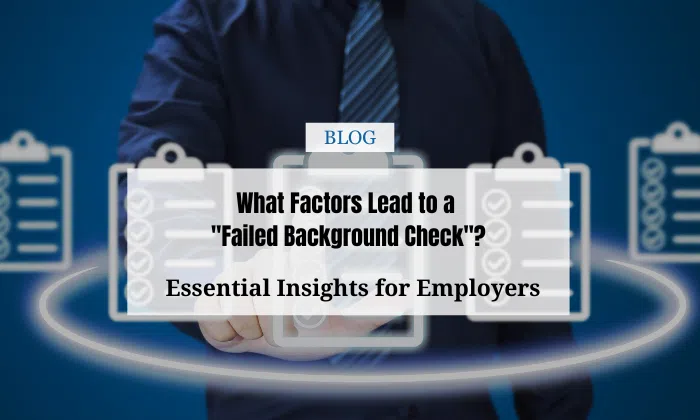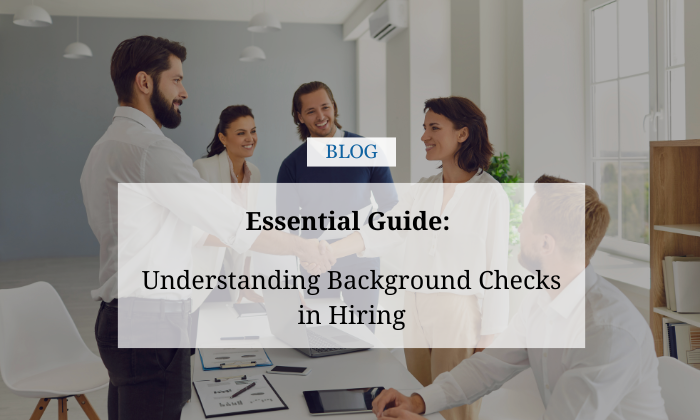In the hiring process, a failed background check can be a significant hurdle. It can halt the progress of a promising candidate and leave employers in a quandary.
Understanding the factors that lead to a failed background check is crucial. It helps employers navigate the complexities of employment screening and pre-employment screening processes.
This article aims to shed light on these factors. It will delve into the common reasons for a failed background check, the implications of a failed criminal background check, and how to handle potential background check errors.
Whether you’re an HR professional, a hiring manager, or a business owner, this article will provide essential insights to help you make informed decisions.
Work with a background check provider like Securecheck360
Here at Securecheck360, we’re experts in delivering reliable, fast turnaround and affordable Employment Background Screening Services, serving businesses of all sizes across the globe. Our customized solutions are finely tuned to meet the unique requirements of small, mid-sized, and large organizations. We’re dedicated to equipping companies with the vital tools and insights they need to make well-informed hiring choices. As one of the leading background verification companies, we’re committed to supporting even small businesses as trusted background check companies for small businesses to ensure they have the confidence to build the best teams for their success.
To know more about our services, book your free demo today!
Understanding a “Failed” Background Check
A “failed” background check doesn’t necessarily mean a candidate is unfit for employment. It simply indicates that the check has revealed information that could impact the hiring decision.
This information can range from criminal history to discrepancies in employment history or falsified educational credentials. Each of these factors can raise red flags in background checks.
Common Reasons for a Failed Background Check
There are several common reasons why a background check might fail. These reasons can vary depending on the nature of the job and the specific requirements of the employer.
- Criminal history and convictions
- Discrepancies in employment history
- Falsified educational credentials
Criminal History and Convictions
A criminal history or conviction is a common reason for a failed background check. This includes both minor offenses and serious crimes. The relevance of the crime to the job role is a key consideration.
Discrepancies in Employment History
Discrepancies in employment history can also lead to a failed background check. This includes gaps in employment, job roles that don’t match the candidate’s claims, or a history of job-hopping.
Falsified Educational Credentials
Falsified educational credentials are another common reason for a failed background check. This includes false degrees, diplomas, or certificates, or claiming to have attended an institution the candidate did not attend.
Legal and Compliance Considerations
When conducting background checks, employers must adhere to certain legal and compliance considerations. These include the Fair Credit Reporting Act (FCRA) and the Equal Employment Opportunity Commission (EEOC) guidelines.
The Fair Credit Reporting Act (FCRA) Compliance
The FCRA requires employers to obtain consent before conducting a background check. They must also provide pre-adverse and adverse action notices if the check results in a negative employment decision.
Equal Employment Opportunity Commission (EEOC) Guidelines
The EEOC guidelines require employers to consider the relevance of a criminal record to the job position. They also mandate an individualized assessment of background check findings to avoid potential discrimination claims.
Navigating Background Check Errors and Disputes
Background check errors can occur, leading to false positives. It’s crucial for employers to understand how to navigate these situations.
Addressing False Positives and Errors
Employers should have a process in place to address false positives and errors. This includes verifying the information and considering the potential for background check errors.
Candidate Dispute Process
Candidates have the right to dispute a failed background check result. Employers should be prepared to handle these disputes in a fair and transparent manner.
Best Practices for Employers
Employers can mitigate the risks associated with failed background checks by adopting best practices. These practices can help ensure fairness and compliance.
Developing a Consistent Background Check Policy
A consistent and transparent background check policy is essential. It helps to avoid potential discrimination claims and ensures all candidates are treated equally.
Individualized Assessment of Background Check Findings
Employers should conduct an individualized assessment of background check findings. This involves considering the relevance of a criminal record to the job position and the potential for rehabilitation.
FAQ’s
How do you know if you failed a background check?
If your background check raises concerns, you’ll likely receive notification from the organization or employer. Transparency and addressing any discrepancies promptly can be key to navigating the process effectively.
How to dispute a failed background check?
To dispute a failed background check, obtain the report, identify errors, and gather evidence. Contact the organization, provide documentation, and maintain professionalism to rectify any discrepancies and move forward positively.
How to clear a bad background check?
To clear a bad background check, gather evidence to dispute inaccuracies and communicate openly with the organization or employer. Address concerns promptly and professionally to demonstrate your integrity and resolve the issues effectively.
What to Do When You Fail a Background Check?
If you fail a background check, review the report thoroughly and contact the organization to discuss discrepancies. Take proactive steps to address underlying issues and demonstrate a commitment to transparency for potential future opportunities.
Conclusion
Understanding the factors leading to a failed background check is crucial for employers to make informed hiring decisions.







